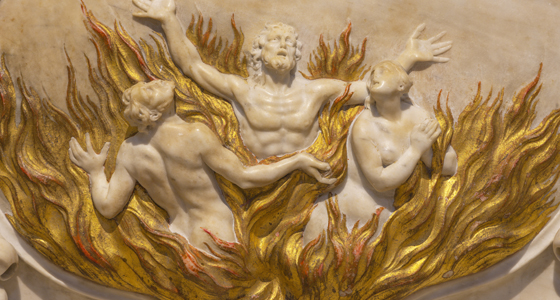I remember when and why I began to believe in the reality of purgatory. It was after taking a funeral and I wondered where the person who had died had gone. It struck me that the doctrine of purgatory (which I had up to then rejected as “unBiblical”) was simply common sense.
I had come to understand that the faith never contradicts common sense although it often transcends common sense. What made sense about purgatory was the simple realization that most people are not good enough to go straight into God’s presence, but neither are most people bad enough to be consigned to the eternal punishment of hell.
What is purgatory? It is not a third place, but a lower chamber of heaven. Everyone in purgatory will get to heaven, but it may take them a long time for they still need to be purified of their sins.
Purification and forgiveness are two different things. An analogy is this: if little Johnny has been playing outside making mudpies and he comes in covered in mud his mother forgives him, but she still needs to strip off his clothes, put them in the washer and shove him in a hot bath. If he has been playing not in mudpies, but in gloss paint or has been playing with a skunk the forgiveness is just as objective, merciful and loving, but the purification may require a longer scrub, the application of solvent (which might sting) and if he’s been playing with a skunk the burning of his clothes and a bath in tomato juice.
For the purification Johnny will need to participate and furthermore–and most important–he will want to participate.
So it is with purgatory–it is the chance to participate in our purification, and this purification is something we will want to do–even if it is painful.
What are the pains of purgatory like? They are not the pains of punishment as much as they are the pains we suffer whenever we set out to accomplish some great goal. If heaven is the goal, the greater the ordeal. What pains do you suffer to overcome an addiction, lose weight or make something great and good? What pains do you suffer if you wish to climb Everest, write a novel, win the Olympics or become a saint? These are the kinds of suffering and sacrifice we experience in purgatory.
Finally–the church teaches that these sacrifices and this suffering is easier here and now while he still have physical bodies than it is when we are in the spiritual realm.
I will agree with the good father. It does make perfect sense. Perfectly common sense. Purgatory is a doctrine written out of a common sense approach to the problem of sin, purification, and heaven. It seals up all the loose ends and makes rational the dilemma we face of sinners at different places in the path of sanctification when death claims them. The only problem is this. It is not Biblical. What makes perfect sense to us is God's wisdom that is as foreign to our reason and comprehension as heaven is far from earth. It makes sense to us but it does not make sense to God's wisdom nor is it imagined in the mystery of the faith revealed in His Word. It is a doctrine that we need but God does not and therefore it is a doctrine that must not stand.
First of all it presumes that the blood of Christ that cleanses us from all our sin is not sufficient to purify us at the last and deliver us without spot or blemish into the eternal presence of our Heavenly Father. Second it presumes that sanctification, which does occur here with our participation and cooperation under the Spirit, is unfinished business when we die and therefore begs us to finish what God began. But do we not pray that God will bring to completion the mystery begun in us in our baptism when He comes in His glory? Is the God who is capable of accomplishing salvation somehow unable to finish what He began and bring us holy and pure by His grace into the eternal kingdom prepared for us and for all who love His appearing -- long before the foundations of the world began? Finally, if this reasonable truth is from God, where is the clear revelation of it in Scripture? Sure, hints of it can always be found by those who craft together bits and pieces of God's Word but there is no sedes doctrinae for this -- only the thoroughly reasonable common sense that it surely must be that way.
And that seals the problem. Either you believe in an infallible pope or church that can extend God's Word to find, promote, and require doctrines not in Scripture or you believe that Scripture is sufficient, not naked or isolated as some might presume, but sufficient in that it is all the revelation we need and all that God has promised until the veil is lifted. An infallible pope and church may determine that reason requires purgatory. An infallible Scripture points us not to reason but to the mystery of God, the power of His mercy, and the promise He has and continues to keep. Hidden in purgatory is our common sense but hidden in the mystery of God that we apprehend by faith is the cross. How oft I have wished that God appealed to our reason and convinced us with a rational explanation but instead He has given me His Son, crucified for my sins and risen for my future. Faith lives there or it does not live anywhere.

No comments:
Post a Comment